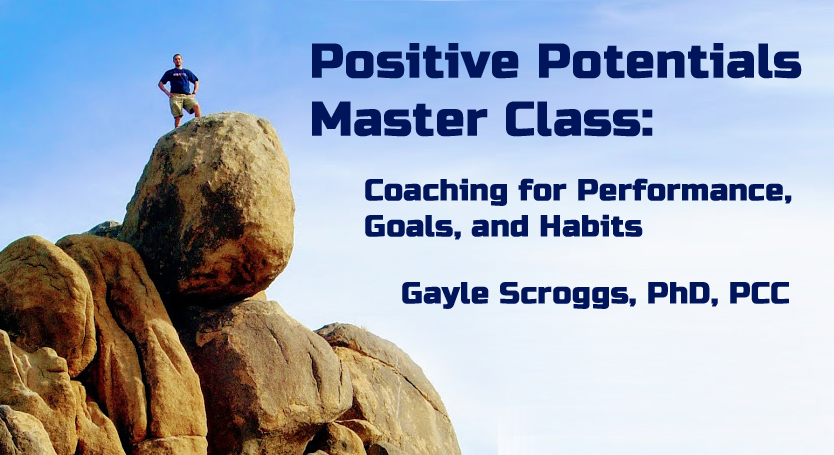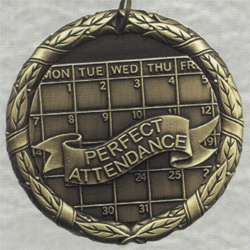 MentorCoach is proud to announce the following exciting Zoom master class:
MentorCoach is proud to announce the following exciting Zoom master class:
Positive Potentials Master Class:
Coaching for Performance, Goals, and Habits
A Live, Interactive Zoom Webinar with Gayle Scroggs, Ph.D., P.C.C.
 MentorCoach is proud to announce the following exciting Zoom master class:
MentorCoach is proud to announce the following exciting Zoom master class:
Positive Potentials Master Class:
Coaching for Performance, Goals, and Habits
A Live, Interactive Zoom Webinar with Gayle Scroggs, Ph.D., P.C.C.
Starts October 2025
8 classes of 90 minutes each
12 hours of CEs and ICF CCEs
12 required hours toward Positive Psychology Coaching Certification
12 hours toward Certified MentorCoach Certification
Tuition:
$695
Or 3 Payments of $249
(plus optional $75 for CA BBS CEs)
(plus optional $20 for ICF CCEs)
Class size limited to 15 students.

Become a Certified Positive Psychology Coach. By taking this course, you will have completed 12 hours toward certification as a Certified Positive Psychology Coach. For information about becoming a Certified Positive Psychology Coach, click here. This course also provides 12 elective hours toward MentorCoach Certification.
 Hear Gayle talk about this class and positive psychology certification, the importance of positive psychology in coaching, how SMART goals are not enough, how talent is overrated, how separating deciding from doing makes all the difference, and how positive psychology will make you a more intuitive and skillful coach. Also hear about her experience in becoming a positive psychology coach while living in Argentina and one little PP hack that you can use immediately for a huge impact on your day. (19 mins)
Hear Gayle talk about this class and positive psychology certification, the importance of positive psychology in coaching, how SMART goals are not enough, how talent is overrated, how separating deciding from doing makes all the difference, and how positive psychology will make you a more intuitive and skillful coach. Also hear about her experience in becoming a positive psychology coach while living in Argentina and one little PP hack that you can use immediately for a huge impact on your day. (19 mins)
Click here to stream or download Gayle’s interview.
1. About This Class
 Maximizing human potential stands out as coaching’s fundamental aim, while positive psychology as the science of human flourishing focuses on optimal human experience and behavior.
Maximizing human potential stands out as coaching’s fundamental aim, while positive psychology as the science of human flourishing focuses on optimal human experience and behavior.
What could be more natural than to integrate these two fields into a course that offers evidence-based approaches for coaches to better inspire their clients to become their best, professionally and personally? Informed by Seligman’s PERMA model of flourishing, this class examines the major factors that facilitate accomplishment and links them to the practice of coaching.
Whether seeking to enhance performance, nurture positive habits, or reach important goals, you will find valuable insights and tools to move yourself and others forward while building fostering sustainable well-being.
Cultivating positive emotions while managing negative ones, engaging character strengths, and harnessing motivational and focusing strategies are key to maximizing one’s potential. The course will also highlight the critical roles of relationships, meaning, and vitality in flourishing and success.
You will discover new insights and interventions you can immediately apply to address common client issues such as these: how to identify and frame one’s “best” goals, the right way to practice for mastery, how to instill habits that stick, how to kickstart motivation, and ways to build focus. You will walk away with clear strategies to apply for optimizing willpower and energy, overcoming procrastination, self-doubt, and other inner blocks, among others.
Developing an appreciation for the basics of self-determination theory, goal-setting theory, and hope theory will ramp up your coaching success as you implement your new skills. Class discussions, stimulating reading, and meaningful homework assignments will deepen the learning.
Coaches, as well as counselors, therapists, educators, and others will be able to apply this to their professions—and to their own aspirations for success and well-being.
There are no prerequisites for this course.
2. What You Will Get Out of this Class

3. The Eight Weeks
Class 1: Overview of coaching for potential: performance, goals, and habits.
Developing human potential is central to coaching, whether dealing with issues of performance, goals, or habits. Discover how principles from goal-setting theory, self-determination theory, and hope theory can inform the coaching process and improve outcomes. See how venturing beyond “SMART” goals can lead to greater motivation and flourishing.
Class 2: Cultivate positive emotions to fuel forward movement.
Research shows that positive emotions fuel movement towards goals. Learn how emotions work, from the inside out, relative to performance and goals. Hone your ability to identify and cultivate them to serve as catalysts for performance and goal attainment. Enjoy a deep dive into the positive emotions that work better than will power.
Class 3: Light the path by managing negative moods and feelings.
How can we help clients and ourselves get out of our own way? This session focuses on negative moods and other inner obstacles, identifying several strategies, from mindfulness to self-compassion, to navigate and overcome such obstacles.
Class 4: Create engagement and build momentum with strengths.
How can we work with a person’s inner resources to develop their full potential? Identifying and optimizing the use of character strengths adds power during and outside the coaching conversation. We will also look at how strengths promote greater meaning, mindfulness, and flow.
Class 5: Avoid delays with strategies for self-control.
Dysfunctional habits, including procrastination, often block success for many clients and ourselves. Fortunately, research offers insights into the root causes and several applied strategies for optimizing one’s use of time and energy.
Class 6: Keep the pace by harnessing mindsets and motivational strategies.
Success is not always all in your head—but that’s a great place to start. Cultivating optimal mindsets and mastering science-based motivational strategies builds awareness and keep the forward momentum.
Class 7: Stay on track by developing focus and mindfulness.
We live in a distracted society. Discover how to leverage powerful tools for staying focused on one’s most cherished objectives. We will also look at how these tools can promote deeper listening in the coaching conversation.
Class 8: Practice good self-care for sustainable progress.
Humans are not machines; our bodies and minds require special care to flourish and succeed. This session explores the instructor’s evidence-based “SANE” self-care model for optimizing performance and productivity.
 4. Who Should Attend
4. Who Should Attend
This course will have high value for coaches and those eager to cultivate human potential through setting great goals, improving performance, and developing positive habits. Coaches, counselors, leaders, human resource specialists, educators, parents, and others are equally welcome.
Note: If you took Positive Psychology Dissertation Coaching (no longer offered), you will find this course overlaps it significantly. Contact instructor before enrolling.
5. Tuition
$695 in full or three monthly payments of $249. For CE information, see below.
6. Readings
Class readings and videos include carefully curated materials by luminaries in positive psychology and coaching. Each week Gayle will provide you with pdfs and links to articles and videos by thought leaders as Barbara Fredrickson, Roy Baumeister, Carol Dweck, Gabrielle Oettingen, Heidi Grant Halvorson, David DeSteno, Ryan Niemiec, Ed Hallowell, and others. Optional materials will also be provided for those who want to delve deeper. These course materials can become the foundation of your own reference library on positive psychology coaching for potential.

7. Class Time and Schedule for this Zoom Webinar
Starts October 2025
8. Open to All
There are no prerequisites for this class. It is open to all, both inside and outside the MentorCoach Community.
9. Coach Certification

This class provides 12 hours toward MentorCoach Certification as an elective for students meeting the class attendance requirement (See #11 below.) The 12 hours can also count toward ICF Certification via the ICF Portfolio Approach. And, most important, it provides 12 hours toward Positive Psychology Coaching Certification.
NOTE: This class is a required course for MentorCoach’s Positive Psychology Coaching certification program. It is also relevant to MentorCoach’s other specific certification programs.
10. ICF Coach Continuing Education
 Live Class Attendance. This class is approved for 12 CCEs (ICF Core Competencies) from the International Coaching Federation for students meeting the class attendance requirement (see #12 below). There is a $20 fee for ICF CCEs.
Live Class Attendance. This class is approved for 12 CCEs (ICF Core Competencies) from the International Coaching Federation for students meeting the class attendance requirement (see #12 below). There is a $20 fee for ICF CCEs.
Listening by Recording. For students who will be listening to this class by recording, this class is approved for 12 CCEs (ICF Resource Development) from the International Coaching Federation for students meeting the class attendance requirement for listening by recording (see #13 below).
11. Board Continuing Education (CEs)

This class is approved for twelve hours of CEs for Marriage and Family Therapists in California (CA BBS). The CE administration fee is $75. CEs for psychologists (APA) are not provided for this class.
To receive credit for CEs, students must pay the CE fee and be present for 10 of the 12 class hours.
Note: The CE fee applies only if you are a Licensed Marriage and Family Therapist in California and need CEs from this organization. Otherwise, when you register, indicate that you do not need to pay the CE fee by choosing the “Base Unit Price with NO CE’s.”
12. Attendance Requirements
 To receive credit for ICF CCEUs in Core Competencies, credit toward MentorCoach Certification, Positive Psychology Coaching Certification, or to receive a Certificate of Completion, you must be present for 80% of the course, attending 10 of the 12 class hours. (How can you be present for half a class? Be present for the attendance code at the beginning or end of a class only.)
To receive credit for ICF CCEUs in Core Competencies, credit toward MentorCoach Certification, Positive Psychology Coaching Certification, or to receive a Certificate of Completion, you must be present for 80% of the course, attending 10 of the 12 class hours. (How can you be present for half a class? Be present for the attendance code at the beginning or end of a class only.)
Every class is recorded, so you can listen again or hear a class you have to miss. As long as you attend 10 of the 12 class hours, you will meet the attendance requirement. If you cannot meet the attendance requirement, you can still earn ICF CCEUs in Resource Development by listening to all 8 classes (see #13 below).
13. Listening by Recording
 Every class is recorded. Some students may listen to some or all of the classes by recording at their leisure, sometimes emailing in questions to Gayle between classes. We applaud and support this practice. We know one well-known Australian professor who used to end his week listening to the recordings of Chris Peterson’s lectures on Friday evenings, drinking white wine and reclining in his hot tub.
Every class is recorded. Some students may listen to some or all of the classes by recording at their leisure, sometimes emailing in questions to Gayle between classes. We applaud and support this practice. We know one well-known Australian professor who used to end his week listening to the recordings of Chris Peterson’s lectures on Friday evenings, drinking white wine and reclining in his hot tub.
Note: Listening to all eight sessions of the class by recording DOES qualify the student to receive twelve hours of ICF CCEUs in Resource Development. For students who will be listening to this class by recording, this class is approved for 12 hours of ICF CCEs (Resource Development) from the International Coaching Federation. To qualify for these ICF CCEs, students must notify Gayle early in the course of their intent to take the class by recording. Attendance-by-recording students must listen to all recordings and submit all class attendance codes within a week after the final class. They may also be asked to pass an open-book exam over the course content.
14. Refund Policy
 You may withdraw your registration at any time before the beginning of the second class and receive a full refund.
You may withdraw your registration at any time before the beginning of the second class and receive a full refund.
You are responsible for the full tuition amount if you do not withdraw before the beginning of the second class.
About Gayle Scroggs, PhD, PCC, CMC
 A social psychologist and seasoned positive psychology coach, Gayle has enjoyed training at MentorCoach for over a decade. A popular university psychology professor in upstate New York for over 20 years, she also developed innovative seminars in innovation, stress, and diversity for the vanguard management program of SUNY’s Empire State College.
A social psychologist and seasoned positive psychology coach, Gayle has enjoyed training at MentorCoach for over a decade. A popular university psychology professor in upstate New York for over 20 years, she also developed innovative seminars in innovation, stress, and diversity for the vanguard management program of SUNY’s Empire State College.
“Sharing the best of psychology to help people flourish has been my professional mission since the 1990’s,” says Gayle, “and plays a central role in my teaching, coaching, and everyday life.” Her passion for positive psychology catapulted her into Marty Seligman’s Authentic Happiness Coaching Program and then into MentorCoach.
A Southern California native, Gayle left snow country in 2003 to bask in the Argentine sunshine with husband Roberto, an Argentine architect and berry farmer. During her eight years there, she co-founded the ICF Argentina Chapter, offered positive psychology coaching and workshops (in Spanish and English), and served as the ICF Expatriate Coaching SIG chair. Leveraging her strengths of creativity, curiosity, and perseverance, she achieved her Professional Certified Coach credential while attending classes via over a dozen public phones since copper thieves kept stealing her neighborhood’s phone cables.
Her grit and vivacity made Gayle a natural choice to design and debut the MentorCoach Resource Group Program. Her weekly calls for students on the practice and business of coaching, coupled with an engaging newsletter, earned her the coveted MentorCoach Pillar Award in 2010. She co-edited the anthology, Women’s Paths to Happiness, contributing chapters on positive psychology and feminist psychology to those by other women coaches. She especially enjoys editing MentorCoach’s All But Dissertation Survival Guide, offering support and inspiration to over 10,000 subscribers, while serving an integral role in the positive psychology program at MentorCoach.
Her international clientele of academics, therapists, coaches, and professionals appreciate her deep empathy, experience, and expertise. Her evidence-based, nuanced coaching encourages them to grow personally and professionally as they improve their performance, cultivate positive habits, and reach important goals. Passionate about issues of positivity, productivity, and flourishing, Gayle receives accolades for her presentations to professional and community audiences alike.
Now settled near the Chesapeake Bay, she coaches full time and savors many moments with her family, friends, and butterfly and herb gardens. She weaves positivity and gratitude into her day by exploring nature, practicing meditation, nurturing local ties, and playing a good game of Scrabble. See her website, www.EssenceCoaching.com, for valuable resources.

